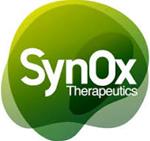
SynOx Therapeutics Announces Board Chair Transition to Align with Advancing Regulatory and Commercialization Strategy
Newly Appointed Board Chair, Philip Astley-Sparke, Brings Transatlantic Late-Stage Development, Regulatory and Commercial Expertise
Strengthened Leadership and Expanded U.S. Presence Positions SynOx for Regulatory Filings and Commercialization of Emactuzumab for Tenosynovial Giant Cell Tumours (TGCT)
/EIN News/ -- DUBLIN, Ireland and OXFORD, United Kingdom, April 01, 2025 (GLOBE NEWSWIRE) -- SynOx Therapeutics Limited (“SynOx”), a late-stage clinical biopharmaceutical company developing of emactuzumab for Tenosynovial Giant Cell Tumours (TGCT), today announced the execution of a planned and orderly transition of its board chair position. Philip Astley-Sparke has been appointed as new chair of the board of directors, reflecting SynOx’s ongoing evolution into a global, commercially focused biotechnology company. Mr. Astley-Sparke succeeds Ton Logtenberg, who has served as board chair since 2021, overseeing the company’s growth into a well-funded, late-stage clinical company.
With its Phase 3 registrational trial of emactuzumab in TGCT underway, SynOx has evolved its strategic focus to prioritize global regulatory filings, commercial readiness and increasing its transatlantic footprint. This builds upon recent corporate milestones including the raising of a $92 million Series B round of funding and the ongoing build-out of its US executive leadership team.
“Ton has been a steady and invaluable partner through a critical period of growth and maturation for SynOx and we are deeply indebted to him for his leadership over the past several years,” said Ray Barlow, Chief Executive Officer of SynOx Therapeutics. “As we embark on our next phase focused on regulatory and commercial activities, we are happy to welcome Philip as our new board chair. His proven experience leading late-stage, transatlantic companies and guiding assets through regulatory approval and launch preparedness will be pivotal as we prepare for the potential commercialization of emactuzumab.”
Mr. Astley-Sparke is a seasoned biotechnology executive with a distinguished track record in building and leading innovative companies across immuno-oncology and rare diseases. With over two decades of experience, he has successfully guided multiple organizations from early-stage through to BLA filing with the United States Food and Drug Administration (FDA) and accompanying commercial launch preparations. He has raised over $1.5 billion in capital and held key leadership roles at Replimune Group Inc, where he currently serves as Executive Chairman, uniQure N.V, and BioVex Group Inc. Notably, at BioVex he played a central role in the development of the first FDA-approved oncolytic virus and oversaw a $1 billion acquisition by Amgen. Mr. Astley-Sparke provides SynOx deep expertise in transatlantic biotech operations, in-house manufacturing scale-up, execution of initial public offerings (IPOs), and strategic growth.
About Tenosynovial Giant Cell Tumour (TGCT)
Tenosynovial Giant Cell Tumour (TGCT), previously termed pigmented villonodular synovitis (PVNS), is a type of tumour that affects the soft tissue lining of joints and tendons. TGCTs are categorised as fibrohistiocytic tumours by the WHO classification and are subclassified based on growth patterns (localised and diffuse types) and location (tendon sheath, intra- and extra-articular forms). TGCTs are locally destructive and can be aggressive. The disease causes significant joint pain, stiffness, loss of function and reduced quality of life. While most patients undergo surgery, more than 50% of those with diffuse TGCT experience tumour recurrence within three years. If left untreated, TGCT can cause joint deformity, degenerative changes, and even lead to arthrodesis or amputation in severe cases.
About CSF-1 and Emactuzumab
CSF-1 (or macrophage colony-stimulating factor) is a cytokine that binds to the CSF-1 receptor (CSF-1R), expressed on macrophages and other immune cells. Emactuzumab is a humanised IgG1 monoclonal antibody targeting CSF-1R, designed to inhibit and deplete macrophages in tumour tissue. Originally developed by Roche, emactuzumab has shown substantial efficacy in clinical studies in TGCT, including an objective response rate of ~71%, rapid tumour reduction, functional improvement, and good tolerability with a manageable safety profile. Emactuzumab may also have utility in other macrophage-driven diseases, and SynOx is actively exploring further development opportunities in these areas.
SynOx recently announced the initiation of the TANGENT study, a global, multi-centre, randomized, double-blind, placebo-controlled Phase 3 trial designed to evaluate the efficacy and safety of emactuzumab in patients with TGCT. Additional study details can be found on ClinicalTrials.gov (Identifier: NCT05417789).
About SynOx Therapeutics
SynOx Therapeutics Limited is a Dublin and Oxford-based, late-stage clinical biopharmaceutical company developing emactuzumab, a best-in-class monoclonal antibody against CSF-1R, for the treatment of Tenosynovial Giant Cell Tumour (TGCT) and other CSF-1-related and macrophage-driven disorders. SynOx is led by an experienced team of industry professionals with a successful track record of developing and bringing products to commercialization. The company is backed by a strong syndicate of premier life science investors including Forbion, HealthCap, Bioqube Ventures, Medicxi, and Gilde Healthcare.

Contacts:
SynOx Therapeutics
Ray Barlow
Chief Executive Officer
Tel: +44 (0) 208 058 5619
Email: enquiries@synoxtherapeutics.com
Vida Strategic Partners (on behalf of SynOx)
Tim Brons (Media)
415-675-7402
tbrons@vidasp.com
Distribution channels: Healthcare & Pharmaceuticals Industry ...
Legal Disclaimer:
EIN Presswire provides this news content "as is" without warranty of any kind. We do not accept any responsibility or liability for the accuracy, content, images, videos, licenses, completeness, legality, or reliability of the information contained in this article. If you have any complaints or copyright issues related to this article, kindly contact the author above.
Submit your press release


